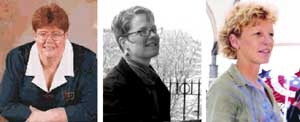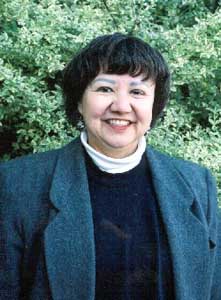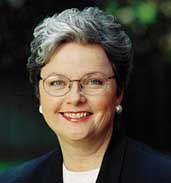-
- Naval Academy grads renew application for gay alumni chapter
- Transsexual’s marriage license case goes to trial
- Pentagon: no direct Boy Scout sponsorship
- Iowa board approves use of gay-themed books
- Canada offering refuge for Americans with post-election blues
- Mass. judiciary interview on same-sex marriage
- Film documents gay and lesbian life in the Lowcountry
- National News Briefs
- World News Briefs
san diego
Nov. 2 election actually a victory
Victory Fund’s ED says we won by electing more GLBT candidates, in more states, than ever before
Published Thursday, 25-Nov-2004 in issue 883
Amid the questioning, analyzing, finger pointing and hand wringing by progressives and GLBT groups speculating about “what went wrong” in the Nov. 2 elections, at least one GLBT organization’s executive director is in a good mood.
For Chuck Wolfe, executive director of the Gay & Lesbian Victory Fund and Leadership Institute, many gays and lesbians actually won on Nov. 2. In fact, 41 of them did – that’s the number of openly GLBT candidates who were elected to political office, across 20 states, on Election Day.
“I think once again we’ve demonstrated that gay and lesbian candidates can win,” said Wolfe in a recent phone interview. “By running good campaigns – strong campaigns – highly-qualified candidates can win.”
Wolfe’s organization spent just over $3 million this year alone in support of 64 GLBT candidates in 27 states and Washington D.C. The Victory Fund provides training, advice, promotion, staff assistance and contributions to GLBT candidates every year from its Washington D.C. headquarters.
The 41 GLBT wins cover a wide range of elected offices in 20 states and Washington D.C. Highlights were the elections of Julia Boseman to North Carolina’s state senate, Nicole LeFavour to Idaho’s state house and Jeanette Mott Oxford to Missouri’s state house; all three women became the first-ever GLBT legislators in their respective states. Other highlights are Sam Adams, who becomes Portland, Ore.’s first-ever openly gay city council member; Lupe Valdez in Dallas, Tex., who becomes the first-ever woman, the first-ever Hispanic and the first-ever lesbian to be elected sheriff in Dallas County.
All this, implies Wolfe, is cause for celebration. So why the tears?
“When the election ended,” said Wolfe, “it took a couple of weeks … to get passed this idea that ‘moral values’ … was the determinant in the election, which in fact it was not. … I think that kind of angered and concerned a certain number in our community. They all got depressed, and it took a while for people to realize … that when you look at the states with ballot initiatives, and see how Bush did and how Kerry did, that in fact it was not a determining factor.”
The GLBT election wins also include five states that passed the much-publicized constitutional amendments banning same-sex marriage in their states. What’s the explanation for the apparent contradiction of states electing openly GLBT representatives, while voting to ban same-sex marriage at the same time?
It’s simple, Wolfe says, gay and lesbian issues were just not a determining factor in the elections, as they’ve been made out to be.
“There was not a huge rejection of everything gay. There was one question [whether or not to amend a state’s constitution] put out there that passed … but it should not equate to a massive level of frustration in our community. … It’s good to know that we do have, within our community, some very smart ways to win.”
Winning smart, says Wolfe, who outlined his ideas in a recent Washington Blade editorial, means doing what Christian evangelicals have always done: training and supporting quality candidates from the grassroots level up, from school boards to the U.S. Congress.
“One of the things we came out of this election with, as we get re-energized in our efforts for equality, is that we have to do it ourselves,” said Wolfe. “It’s our responsibility and we have to accept it, and I definitely think there’s an acceptance of that, and an understanding of that as a result of the elections.”
Kevin Tilden, a San Diegan who works as the external affairs director for California American Water and has served on the Victory Fund’s national board for more than a year, agrees that the message from the recent elections is just reconfirmation that the GLBT community and GLBT issues can win the day when the fight starts locally.
“I think [the election] really supports the strategy of starting at the local level,” Tilden said in a recent phone interview, “whether it’s school board or parks council … I think we have to really start at the local community if we want to win at the state and national level in the coming years.”
Another aspect of training and supporting local GLBT candidates, said Wolfe, involves getting on the offensive in the efforts for equality, rather than being forced to fight battles on the defensive, as the community did with the state ballot initiatives to ban same-sex marriage.
“Someone else played offense and picked that battle,” said Wolfe, “I think it’s an important thing to remember that when you pick your battle … it’s a good thing for the community to see, and it’s a good thing for the community to rally around.”
GLBT election winners have multiple impacts, explained Wolfe. Just by running, he said, a GLBT candidate emerges as an out leader in the community. Once they’re in office, GLBT representatives forge alliances and relationships with their non-gay peers, having a personal and professional impact on people in leadership positions. As pieces of legislation are brought forward, GLBT representatives can “ask the simple questions,” whether the issue is education or health, Wolfe explained. “In most cases they begin to change the course and the tenor of the debate simply by being there.” Ultimately, GLBT representatives impact a region by getting legislation passed.
The whole process begins, Wolfe said, with qualified GLBT people stepping up to run for office, and for others to support them.
“It’s good to get involved,” said Wolfe, whose organization will continue to support the 40-some candidates running for office in 2005. “We have to step up, and there are ways to do that. I encourage people to do it if they can.”
Tilden agrees. “I think in California this election, not a single seat in the California assembly changed hands … and I think that makes it easy for us [Californians] to rest on our laurels. But we have to look behind us to states that aren’t as far along on the curve as us, and lend them a helping hand.”
For more information about the Victory Fund, link to the organization’s websites at www.gaylesbiantimes.com.
|
|
Copyright © 2003-2025 Uptown Publications





